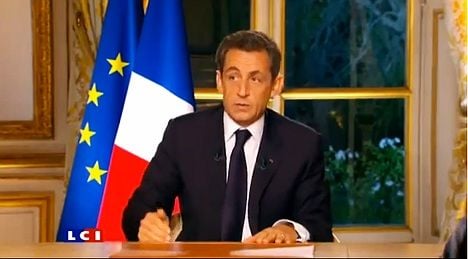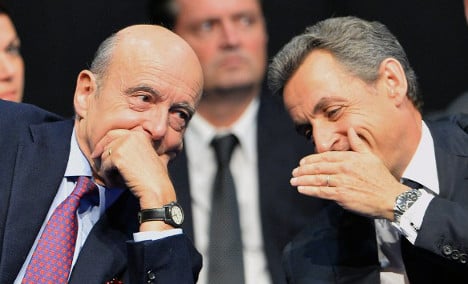Speaking in a rare national television interview, Sarkozy said he and other European leaders had avoided a global “catastrophe” by agreeing a deal to tackle the eurozone’s debt crisis.
Trailing his Socialist rival François Hollande in the polls ahead of an election due next spring, Sarkozy also lauded his administration’s economic record, despite having to admit the government was lowering its 2012 growth forecast.
“If the euro had exploded last night, all of Europe would have exploded,” Sarkozy said.
“If Greece had defaulted, there would have been a domino effect carrying everyone away,” he said. “If there had not been an agreement last night, it was not just Europe that would have sunk into catastrophe, it was the whole world.”
Sarkozy was speaking after European leaders clinched a deal that will address the debt mountain in Greece, cutting it by €100 billion ($142 billion) in an agreement between the eurozone and private creditor banks which will take a 50 percent loss on their holdings.
Ahead of an election set to be dominated by the economy, Sarkozy was forced to admit that the government had lowered its growth forecast for next year from 1.75 percent to 1.0 percent.
He warned that the government would soon be announcing extra measures to make up for a budget shortfall of between six and eight billion euros but, sticking with his centre-right policies, said the measures would focus on boosting competitiveness.
“The key is growth and jobs,” he said, adding that he opposed a general increase in France’s value-added tax because it would “weigh on the purchasing power of the French people.”
He praised his government’s prudent economic policies, in particular pension reforms, saying the reform “had protected France and protected the French people”.
Hollande had earlier hit out at Sarkozy over the eurozone agreement.
“An agreement… was necessary, from this point of view the worst was avoided. But several points seem inadequate, both on the financial and the economic level,” Hollande said in a statement.
“Why wait so long to finally take measures equal to the stakes, if not to protect a banking sector that should have been called on to sacrifice far earlier,” he said, also hitting out at the eurozone’s decision to turn to Chinese capital for help.
Sarkozy, elected in 2007, is facing a tough challenge on the left from Hollande, whose profile was boosted this month by the Socialists’ unprecedented US-style primary, which drew 2.8 million voters to the polls in its final round and won widespread media coverage.
An opinion poll released after the Socialist primary showed Hollande crushing Sarkozy with 64 percent to 36 percent of the vote in the run-off of a presidential election.
France is to vote in a presidential election next April and, if as expected no candidate wins a first-round majority, in a second round in May.
Though widely expected to run, Sarkozy has yet to officially declare his candidacy and was coy when asked about it on Thursday.
“The debate on the question of my candidacy will be settled at the end of January or early February,” he said, adding that to declare his candidacy too soon would distract him from governing the country.
“I have made my choice, to be president up until the last minute,” Sarkozy said.



 Please whitelist us to continue reading.
Please whitelist us to continue reading.
Member comments